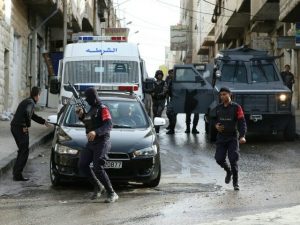As Jordan becomes the target of an increasing number of Islamic State-affiliated terror attacks, the country’s press is calling on the government to do more to combat extremism, warning that hundreds of thousands of young Jordanians may support the terror group, like reported by breitbart.com.
With some 4,000 Jordanian nationals having joined the Islamic State in Syria and Iraq since 2011, Jordan has the second highest number of recruits after Tunisia, according to a report published by the Congressional Research Service.
The most recent attack took place on December 18, 2016 at the 10th-century Karak Crusader castle, killing four security officers, two civilians and a Canadian tourist. Four IS operatives were also killed in the attack and later investigations revealed that three of them had served time in prison for prior attempts to join the terror group. The same cell also planned several large-scale terror attacks elsewhere in the country.
In the aftermath of the attack, senior journalists warned that the government was not taking the situation seriously enough, according to articles gathered by the Middle East Media Research Institute. Indeed, since January of this year, several steps have been taken to prevent future attacks, including longer prison sentences and even hangings of terror operatives.
Jumanah Ghanimat, editor-in-chief of the daily Al-Ghad, slammed the government for playing down the situation, for example by calling the terror cells “sleeper cells,” and for its overall “leniency and laxity” in dealing with them.
Ghanimat cites “public opinion polls [that] show that hundreds of thousands of people in our society are sympathetic to this stream” of extremist ideology.
“This requires [us] to begin a long process of reforming our ideology and values,” she added.
A senior contributor in the same paper, Fahd Al-Khitan, warned what would happen once IS recruits returned to Jordan.
According to Al-Khitan, there are at least 400 Jordanians in prison who have either returned from fighting alongside IS in Syria and Iraq or who were arrested trying to join the group. In addition, the several hundred who are currently in those countries will eventually come home and “engage in their terrorist activities.” There are also several hundred extremists – 500 according to Al-Khitan’s estimate – that have finished their prison terms.
“If we add to that the hundreds [predicted] to return from Syria, who are highly skilled fighters, we will have terrorist brigades moving freely in society,” he writes.
Al-Khitan calls for a “new strategy” to “paralyze these savage brigades and uproot them from society.”
Following the Karak attack, Muhammad Abu Rumman, a researcher at the Center for Strategic Studies at the University of Jordan who specializes in Islamist groups and is also a columnist for Al-Ghad, called for an overhaul of the current methods of rooting out terror.
According to Abu Rumman, imprisonment should not necessarily be the go-to method of deterrence, since, he claims, prisons have become “centers for recruiting, training, teaching and indoctrinating members of the organization.”
“Extremism, terrorism and violence are a system of views related to frustration, disappointment, nihilism and religious stagnation. We face a long and arduous historic task, but it is a necessary ‘rescue mission’ for the coming generation and societies,” he notes.
Abu Rumman further blasts the government for its failure “to admit that [Jordan] has environments that produce and export terrorism.” This has led to several other major oversights, including the lack of facilities aimed at “monitoring extremist ideology in order to map it and examine its trends” and the lack of any attempts to try and unravel the methods that extremists use to attract and recruit people.
Zulikha Abu Risha, a journalist, educator and columnist for Al-Ghad, charged successive Jordanian governments with tolerating religious extremism in society, paving the way for what she calls “hotbeds of terrorism.”
She even accuses the country’s education system of aiding and abetting terror by inviting extremists to spread radical Islamic ideology in schools.
Now there is a new trend: Under the watchful eye of the Education Ministry, schools invite young propagandists to teach the [next] generation memorization of everything that requires the elimination of the mind, and inculcate obedience. No one invites authors, poets, pundits, musicians and artists, who will ask questions and cultivate brainstorming. While scientific research in other countries is at its peak, some of our universities offer lectures for the general public dealing with demons, spells and other such nonsense. What is catastrophic is that all this is done in the name of Islam!
Abu Risha’s call for more moderate and inspiring role models to be presented at schools echoes similar statements made by Jordanian officials and educators in 2015. In December of that year, Breitbart Jerusalem published a report citing MEMRI in which leading figures in Jordanian society called for an overhaul of the country’s extremist education system. Former minister of culture Sabri Rbeihat said society was increasingly steeped in a “culture that hates life, celebrates death, and attacks and quickly eliminates anything symbolizing liberty, life and happiness.”



